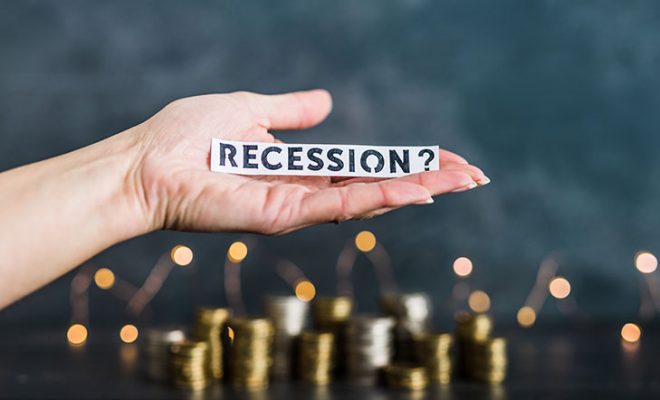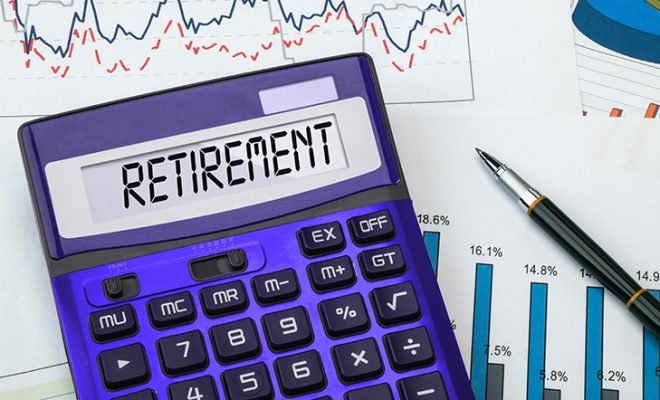How to Make Your Retirement Income Plan Recession-Proof

If you have been diligently planning for your retirement, but the talk of recession is making you uneasy, you are certainly not alone. With the stock market falling, inflation increasing, and an impending recession, the portfolios of retired and young investors as well as those nearing the retirement age are taking a hit. Things are graver for those planning to retire in a few years or already on the brink of retirement. Retirement during a recession can be troublesome and worrying. All your life’s hard work and savings are at stake. Moreover, due to increasing age and minimal work opportunities in retirement, the possibility of rebuilding this wealth is bleak. Therefore, it becomes necessary to make your retirement recession-proof.
Given the ways things are materializing the world over as well as in the US, a recession may be about to hit the economy sometime soon. It may not be possible to predict its precise timeline. However, doing some things that can make your portfolios immune to recession or other similar economic downturns is essential. These measures are crucial every step of the way, irrespective of whether you are young, twenty years from retirement, five years from retirement, or already retired. You can incorporate them into your daily financial planning routine or refer to them from time to time as and when you feel the need to. They cannot help you avoid recession, but they can help minimize its impact on your financial standing. If you wish to safeguard your investment portfolio against the effects of the recession, consult with a professional financial advisor who can advise you on the same.
Keep reading to find out how to protect your money from recession and safeguard your long-term financial goals.
How to prepare for a recession if you are retired
Here are some things you can do to protect your retirement income against market movements:
1. Avoid panic selling your stocks:
When the stock markets start to fall, the first reaction of most investors is to panic and sell their stocks. Panic or, for that matter, any emotion in investing can lead to issues in your long-term wealth creation. Investments require a rational and balanced outlook. Emotions, bias, preconceived notions, or peer pressure seldom result in good returns. Therefore, selling your stocks at the onset of a recession will not bring you any significant benefits. It is important to understand that the market is cyclic. Every business cycle lasts for a while and is then replaced with a new one. So, a recession is not likely to stay forever. When the markets shrunk in the recession of 2008, stock prices bounced back by 2013. This may have seemed like a long stall, but investors did regain their lost money eventually. Your money in stocks is not lost until you redeem it. It is only after the sale is complete that your loss is indeed confirmed. If you let your stocks lie in your brokerage account as it is, they have the potential to recoup when the markets recover. Therefore, avoid panic selling at all costs and let your money recover.
If you are retiring during a recession, this may be an alarming time, and you may not have as much time as others who are still years from retirement. However, try to look at the complete picture. Your stocks or other market-linked products are not your only investments or sources of income. You may have life insurance annuities, Social Security benefits, cash savings, pension, health insurance, etc., that are not as volatile as stocks. So, you can still get by the initial years. At this time, your focus can be to live frugally and let time pass.
2. Maximize your retirement account contributions:
If you are wondering what to do with your 401k before the recession or how to invest in an Individual Retirement Account (IRA) during this time, you can focus on maximizing your contributions. Your 401k and IRA consist of a combination of instruments like stocks, exchange-traded funds, target date funds, bonds, money market accounts, certificates of deposit, etc. If you are young, your asset allocation would be more in stocks than other securities so that you can earn more in the long run. If you are closer to retirement, you may like to switch to more conservative choices as they can help you achieve balanced returns even in a volatile market. No matter what you choose, maximizing your contributions and continuing to invest in retirement accounts is essential. Retirement accounts are, in many ways, the foundation of a secure retirement. When the stock prices fall, you can buy more at discounted rates and earn high returns when the markets bounce. This is also known as buying the dip. The stock market is all about making the most of the right opportunities at the right time, and a recession can be the ideal time to do this. The contribution limits for a 401k in 2022 are capped at $20,500 for those below the age of 50 and $27,000, including $6,500 as catch-up contributions for those aged 50 or older. For IRA, the annual limit is capped at $6,000 for those aged 50 and $7,000, including a catch-up contribution of $1,000 for those aged 50 or older. Try to contribute up to these limits to build a large corpus.
SPONSORED WISERADVISOR
3. Settle your debts at the earliest:
A recession can be a challenging time as it is. If you were to add the liability of paying back loans or your credit card dues, things could be even more complicated. A lot of people risk losing their jobs during a recession. For those who manage to keep it, the chance of drawing a lower salary than usual is high. If you happen to lose your job, you would be struggling with covering your basic costs like rent, gas, food, water, electricity, etc. If you add the burden of settling debt on top of this, you can find it hard to make ends meet. This can lead to missed repayments, which ultimately affect your credit score and impacts your peace of mind. Therefore, as a rule of thumb, getting rid of your debt on priority is extremely important. You may want to focus on this, especially with talks of recession hitting the economy in the near future. If you have any ongoing debts, such as loans, mortgages, credit card debt, etc., try to pay them off right now so that you are debt-free when recession strikes. This way, even if you end up losing your job, you can use your emergency fund savings to cover your essential needs and not loans.
4. Create an emergency fund:
An emergency fund is a critical financial tool that can help you in every phase of your life. However, its relevance can be further amplified in the case of a recession. As stated above, a recession can lead to unemployment, reduced salaries, loss in investments, etc. However, the expenses go on as before. Irrespective of whether you lose your job or not, your expenses will remain the same. You will still have to pay rent, clear your electricity bills, pay insurance premiums, and above all, buy food. So, having an emergency fund is crucial. Having an emergency fund will ensure that you have a safety net if things go south. Usually, financial experts recommend saving up at least six to eight months of your salary in an easily accessible account, such as liquid funds, bank accounts, etc., as your emergency savings. This way, if you are in a financial emergency, you will be able to depend on your emergency savings to cover your needs. If you do not have an emergency fund, you will be forced to liquidate your retirement investments. In the long run, this can adversely affect your retirement security. Moreover, you can also incur penalties and trigger extra tax. For instance, the Internal Revenue Services (IRS) can levy a 10% penalty on withdrawals made before the age of 59.5 years or if you have held the account for less than five years. So, if you think you can depend on your IRA or 401k in your hour of need, know that this will come at a price. Firstly, you will be taxed for the excess income for the year in the case of a traditional retirement account. Secondly, you will pay the penalty. And thirdly, you will lose out on the opportunity for your money to grow.
5. Avoid major purchases:
If you have any major expenses lined up for you, a recession may not be the ideal time to purchase them. Irrespective of your initial planning, a recession may call for the need to modify your purchase plans. For instance, if you are thinking of buying a home at the onset of a recession, you may want to postpone the purchase. Even if you get approved for a home loan and have a steady income to pay off the settlements today, there is a possibility that you could lose your job or have other financial limitations when a recession strikes. At such a time, the money that you have saved up for a home can be used to cater to other essential needs. Moreover, you will also save up the hassles of a loan and instead be able to concentrate on the more essential things in life. This approach is also applicable to relatively smaller purchases, such as buying a car, planning an expensive holiday, etc. At this time, you may want to focus on your present and future financial security in retirement.
Additionally, if you are already retired, you may not have a job to lose. But you would still have a relatively low-valued investment portfolio. So, tracking your expenses and avoiding unnecessary expenditures will be necessary. If you have adult children and grandchildren, you may want to focus on your own expenses instead of helping them with their education costs or other needs. They can still take loans as they have their whole lives ahead of them to repay them. However, you would have a limited time in retirement with restricted means to earn more money. So, prioritizing your retirement during a recession is crucial.
To summarize
Retiring during a recession can be scary, to say the least. However, if you have followed a balanced investment and savings approach all your life, you will be able to navigate your way quickly. If things seem worse, you always have the option to postpone your retirement or take up a part-time job to support yourself. However, since it can be hard to find a job in a recession, it may be advised to follow the tips given above instead. In addition to this, it is also essential to diversify your investment portfolio, invest consistently all through your life, be mindful of your expenses, and plan ahead for the worst-case scenario. Moreover, if things seem complicated and you need help, you can always consult with a financial advisor in your area and get a professional’s perspective.
If you wish to learn how to make your retirement plan recession-proof and secure your retirement income in the future, engaging the services of a professional financial advisor would be in your best interests. Use the free advisor match service to connect with 1-3 financial advisors based on your financial requirements. All you need to do is answer a few simple questions about yourself and the match tool will find advisors that match your financial needs.
For further information on creating a suitable retirement plan for your unique financial requirements, visit Dash Investments or email me directly at dash@dashinvestments.com.
About Dash Investments
Dash Investments is privately owned by Jonathan Dash and is an independent investment advisory firm, managing private client accounts for individuals and families across America. As a Registered Investment Advisor (RIA) firm with the SEC, they are fiduciaries who put clients’ interests ahead of everything else.
Dash Investments offers a full range of investment advisory and financial services, which are tailored to each client’s unique needs providing institutional-caliber money management services that are based upon a solid, proven research approach. Additionally, each client receives comprehensive financial planning to ensure they are moving toward their financial goals.
CEO & Chief Investment Officer Jonathan Dash has been covered in major business publications such as Barron’s, The Wall Street Journal, and The New York Times as a leader in the investment industry with a track record of creating value for his firm’s clients.











